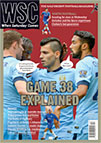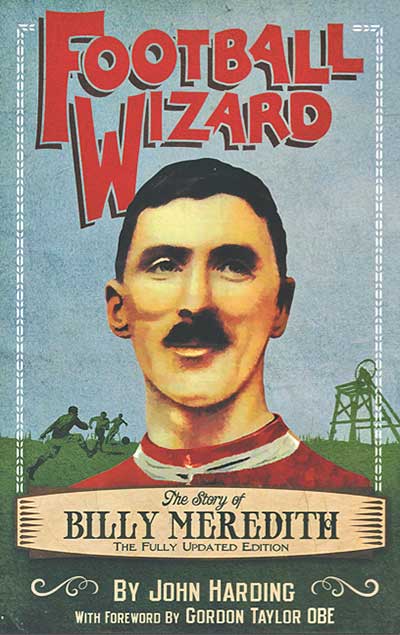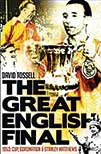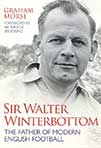
Search: ' Stanley Rous'
Stories
 With declarations of superiority and personal messages from leaders, Jon Spurling looks at why the 1934 meeting of England and Italy was as much about politics as football
With declarations of superiority and personal messages from leaders, Jon Spurling looks at why the 1934 meeting of England and Italy was as much about politics as football
In November 1934, world champions Italy arrived at a packed Highbury to face an England team containing seven Arsenal players: Wilf Copping, Ray Bowden, George Male, Frank Moss, Ted Drake, Eddie Hapgood and Cliff Bastin. Benito Mussolini had claimed “Good kicking is good politics” and described Italy’s World Cup victory the previous summer as a “triumph for fascism”. Although tempting to suggest that Italy were little more than a collection of 11 sporting soldiers, the England players were also expected to demonstrate the superiority of the Britisher.
 The story of
Billy Meredith
The story of
Billy Meredith
by John Harding
Empire Publications, £16.95
Reviewed by Mike Ticher
From WSC 332 October 2014
If you had to choose one player to encapsulate the Edwardian football world, you would be hard pressed to do better than Billy Meredith. In an extraordinary career, which ended in 1924 FA Cup semi-final defeat at the age of 49, the celebrated Welsh winger was central to many of the era’s key moments.
He scored the winner for Manchester City in the 1904 FA Cup final, then won the League with Manchester United in 1908 and 1911, and claimed another Cup winner’s medal in 1909. He was with United when Old Trafford opened in 1910, and back with City when they moved to Maine Road in 1923.
But Meredith’s greater significance lies in his turbulent relationship with clubs and the football authorities, and his key role in setting up the Players’ Union, the forerunner of the PFA. In 1905 he was suspended for a year after the FA found him guilty (in a closed inquiry) of trying to bribe an Aston Villa player to lose the final game of the season. Incensed by City’s perceived failure to support him, Meredith spilled the beans on bonuses the club had been paying in breach of the recently introduced maximum wage. The case devastated City, sparking the departure of Meredith and several others to United, and cemented Meredith’s hostility to the hypocrisy of the system, as well as personal bitterness over money that would last until he died, a poor man, in 1958.
The suspension helped drive Meredith to re-establish the union, which collided head-on with the FA in 1909, when the whole United team was suspended for refusing to sign contracts that effectively meant disowning the union. Its fledgling power was broken, but its structure survived to give birth to the PFA, which finally defeated the maximum wage and the iniquitous retain-and-transfer system in the early 1960s. As the postscript to John Harding’s book notes, it was not until the Bosman ruling that Meredith’s full vision of contract freedom was realised.
As if all that were not enough, Meredith was also involved, though not implicated, in the 1915 fixed match between Liverpool and Manchester United, for which eight players received life bans – the final scandalous blast of United’s years as a “rebel” club of stubbornly confrontational players.
Harding’s groundbreaking biography was first published in 1985, and has worn well with little amendment. Without over-elaborating, he sketches a rounded portrait of Meredith’s complex personality, rooted in his Methodist upbringing in the mining village of Chirk. Meredith’s rigorous attitudes to fitness, work, industrial solidarity, Welsh nationalism and alcohol (he was a teetotaller, despite running pubs in retirement) are neatly teased out in that context.
But there is still room for a fascinating broader picture of Manchester football in a tempestuous phase of its development, and thoughts on how Meredith’s playing style meshed with the tactics of the day – in curmudgeonly old age he scorned the new-fangled ways of whippersnappers such as Stanley Matthews.
Meredith complained that the Edwardian FA treated the professional footballer as “a mere boy, or a sensible machine or a trained animal”. Harding’s work is far from a dry polemic or hagiography, but a timely reminder of how the players’ struggle to overcome that contemptuous attitude began.
 1953: Cup, Coronation and Stanley Matthews
1953: Cup, Coronation and Stanley Matthews
by David Tossell
Pitch, £16.99
Reviewed by Charles Robinson
From WSC 319 September 2013
Sixty years on, no cup final has yet matched the game in 1953 in which Blackpool beat Bolton 4-3 with a late intervention from the incomparable Stanley Matthews. In The Great English Final author David Tossell relates the full story of this famous day, weaving social and economic history with the tale of the game to great effect.
Aside from the match reports which bookend the chapters, not just of the game itself but of the rounds leading up to the final, Tossell expertly discusses a range of issues which touch on the modern game. In one chapter, he addresses players’ wages and the challenges that big-name stars, such as Stan Mortensen – scorer of a hat-trick in the 1953 final – went through to secure a decent wage and to protect themselves against their inevitable and oncoming retirement. Although, in Matthews’s case, that wouldn’t happen for a few years yet.
Another topic that exercises Tossell is that of the supposed tactical naivety of British football in the post-war period. As he explains, 1953 was the year not only of the coronation of Elizabeth II but also the year of England’s famous and chastening defeat by Hungary. This disastrous result could have heralded a period of deep introspection, of the kind wished for by many England fans today. However, the author argues that English football fans were more concerned with entertainment than with sophisticated displays of tactical ingenuity after many years of war, hardship and suffering.
Despite that, Tossell also highlights the reckless attacking philosophy of the Blackpool manager Joe Smith, at the same time revealing the profound differences between the methods of managers in that post-war period to our own. The captain of the team was much more significant in those days and a delightful early chapter on Blackpool skipper Harry Johnston demonstrates this.
Of course, the book leans towards Blackpool, Matthews and his incredible achievements. The narrative is compelling, as the 38-year-old Matthews, a defeated Wembley finalist twice before, defies age to claim the medal that he promised his father on his deathbed. Interestingly, Tossell also uses contemporary analysis of the game, using Opta statistics to show that Matthews was, in fact, not the most effective player on the field. Ernie Taylor, Mortensen and Bolton’s Willie Moir, among others, were all more productive according to the modern analysis.
Nonetheless, the final is fittingly described as the Matthews Final. Tossell derides the contemporary media for skewing and distorting any soundbite from players and managers so as to fit in to some predetermined story. But the Matthews tale gripped the nation and even the Bolton players and supporters celebrated with him. Matthews was a genuine star before the media obsession with football and the cult of celebrity that blights the modern game. Tossell, rightly shortlisted many times for the British Sports Book awards, tells a riveting story of social and sporting history, weaving his narrative strands inwards towards that famous late goal scored not by Matthews, but by one Bill Perry, another forgotten hero of that famous day.
 The father of modern English football
The father of modern English football
by Graham Morse
John Blake, £17.99
Reviewed by David Stubbs
From WSC 317 July 2013
My earliest memory of Walter Winterbottom, manager of England from 1946 to 1962, is from a second-hand copy of the FA Book For Boys. His name spoke to my infant sense of humour, though I assumed he harked from a more didactic, purposeful age when no one had time to find the word “bottom” amusing. I also heard him providing co-commentary for the 1966 World Cup final, his vowels a strange mix of received English and suppressed Lancastrian. Like his successor, Alf Ramsey, Winterbottom had felt obliged to brush up on his elocution if he was to be taken seriously. Such class considerations abounded in his era, in all their absurdity – author Graham Morse recounts how FA secretary Stanley Rous had been reprimanded by the FA chairman for wearing plus fours when his predecessor, Sir Frederick Wall, had worn a top hat and frock coat to games.
Winterbottom himself was quite the modern man – an Oldham lad who had made his way in the world on academic merit, who understood the value of tactics, technique and advanced coaching skills. He gained a reputation as a “pedagogue” for trying to impose these methods on often-reluctant players, Stanley Matthews in particular, who thought the best way to play was to bloody well get on playing, and that skill was something you were born with. Winterbottom understood what he was up against – that in England the game had deep-rooted, violent beginnings which encouraged a crude approach, whereas in Europe and South America the game had been taken up at more middle-class levels, and was more open to theory-based technically sophisticated methods.
Winterbottom was England manager when the team lost 1-0 to the US at the 1950 World Cup. However, his hands were tied. He was never allowed to pick the team – a dubious panel of selectors did this job, whose whims once led them to grant 38-year-old Leslie Compton his first cap. He also had to put up with Matthews being ordered on a goodwill tour of Canada during the tournament. As for the 1953 defeat to Hungary, he was almost alone in understanding that the Magyars would be formidable opponents. Contemporaries such as Chelsea manager Ted Drake, however, continued to insist that England’s problem had been physical fitness rather than formation and tactics.
Morse is the son-in-law of Winterbottom, who would have been 100 this year, and his account is naturally sympathetic. It’s deservingly fulsome as well as being engagingly redolent of his era, in which Winterbottom was paid just over £1,000 a year, of players arriving at games by tram, laced balls carried around in nets, and courtships shyly conducting on hills overlooking mill chimneys. The title isn’t an overstatement – Ron Greenwood, Bobby Robson and Trevor Brooking all took on board Winterbottom’s philosophy. That England continue to fail is more to do with the institutional obtuseness Winterbottom himself never managed to break down, as opposed to his enlightened approach, whose time may not yet properly have come.